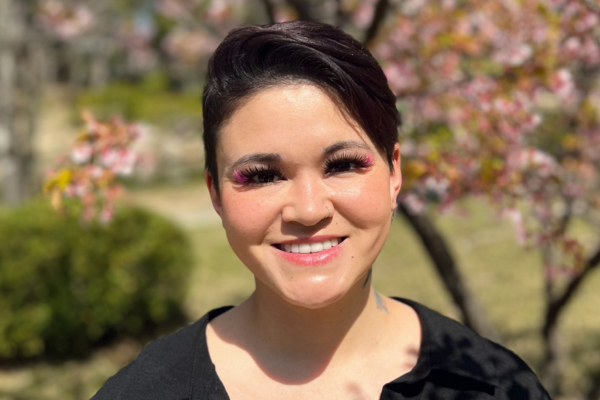Research Spotlight: Corinne Sugino

Periodically the Communications Team reaches out to members of the Department of English faculty and graduate program and asks them to elaborate on a current research or creative project they are working on or have recently completed. For this spotlight, we asked Assistant Professor of Asian American Rhetorics, Corinne Sugino about her book, Making the Human: Race, Allegory, and Asian Americans (Rutgers University Press, 2024), and about the future of her research.
How would you explain your project to someone who isn’t familiar with your field?
My book project looks at the way that racial and gendered narratives in law, media, and popular culture help to construct a limited understanding of what it means to be human. Specifically, I am interested in this topic as it relates to contemporary issues facing Asian Americans, including the recent affirmative action legal battle Students for Fair Admissions v. Harvard, popular media depictions of Asian Americans, and public discourses about Asian Americans during the COVID-19 pandemic. As I explain, Asian Americans become important figures in how we make sense of abstract (but nevertheless deeply important) concepts such as “justice,” “nation,” and “equality.”
How would you describe your project to a colleague in your field?
My book considers how anti-Asian violence relates to the racialized and gendered construction of the human. Drawing on work in Black studies, Asian American studies, rhetorical studies, and cultural studies to theorize what I call racial allegory, or the way that cultural, media, and institutional narratives mobilize categories of difference to stabilize Western Man. “Western Man” is a concept/term I draw from scholars such as Zakiyyah Jackson, Sylvia Wynter, and others, who problematize the idea of the “human” as a neutral or objective category and illustrating how it is informed by anti-Blackness and colonialism. Making the Human grapples with what role Asian American racialization plays in this, as well as how it interacts with anti-Blackness and colonialism. In recent years, Asian Americans have emerged as key narrative figures in various social issues, whether they are framed as carriers of disease during COVID-19, as meritorious and studious college applicants in the affirmative action battle, or as symbols of diversity in Hollywood. Though these may seem like unrelated narratives, they are all doing work: to shore up American exceptionalism, to police the boundaries of the nation, to reframe anti-Blackness in the language of “justice” (e.g. in the affirmative action case), and so on. I argue that these narratives illustrate the role that Asian American racialization plays in stabilizing Western Man, and I examine the ways that Asian American communities have challenged these limiting frameworks in response.
Why did you become interested in this project?
I became interested in the project because of the number of conflicting narratives about Asian Americans that were simultaneously circulating in public discourse. Whether it be about higher education, public health, popular media, and so forth, Asian Americans were these key narrative figures. And I wanted to consider multiple types of narrative or rhetorical sources (law, popular media, etc) rather than only one because racialization is a process that does not obey neat communicative or disciplinary boundaries: it travels across these areas of public life in dynamic ways. Additionally – and I think this is true of various scholars and activists - I also wanted a more nuanced vocabulary for making sense of anti-Asian racism than was often available. For example, during the COVID-19 pandemic, we also witnessed a lot of rhetoric about the need to combat anti-Asian hate and hate crimes against Asian Americans. Many times, these narratives framed anti-Asian racism as isolated incidents of explicit vitriol committed by fringe racists, and I think this narrative does a disservice to the way that anti-Asian racism is not just acts of hate. It is much more complex than that: it is state-sanctioned and systemic (not individualized or exceptional), and it is interrelated with systems of anti-Blackness, colonialism, capitalism, and gendered violence. Finally, as I get at in the last chapter, despite popular and sometimes academic narratives to the contrary, Asian American racialization is deeply intertwined with carceral systems, and taking that into account provides a more nuanced understanding of power and inequality in the contemporary era.
Are you working with any colleagues or collaborators, or anyone else supporting your work?
I’m very grateful to everyone who has been a source of support along the way. Many caring mentors, colleagues, friends, and family have been encouraging, provided feedback on earlier drafts, or helped me to navigate the process of publishing my first book. And of course, I want to express my appreciation for my wonderful students over the years, who always challenge me to think deeper and inspire me in my research and teaching.
What have you been working on since the completion of your project?
Right now I am working on a project that reframes the “model minority” not simply as a “false representation” or “myth” but as a carceral logic. Actually, it sort of picks up where the last chapter of my book leaves off, as the last chapter of Making the Human is interested in the relationship between Asian Americans and carceral systems. So this article will consider how institutional practices and rhetorics frame Asian Americans as “model minorities” in a way that isn’t just a “false” stereotype but part of how social narratives rationalize a punitive, carceral regime of power.
